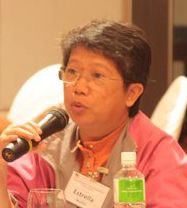CSO volunteer and community leader Ester Alkonga had long been involved in grassroots projects in Pangasinan, northern Philippines, in her capacity as the Executive Director of Responsible Citizens, Empowered Communities and Solidarity towards Social Change (RECITE, Inc.), a citizens’ group that works to build the capacities of local leaders to manage community programs and projects.
Her years of active participation in election monitoring showed her that people can engage government meaningfully toward good governance. However, she also realized that people do not know their rights. “They have to be educated about their rights and know that they can be part of the governance process; that there are mechanisms for them to be involved in the decision-making process of government officials at the community level. “Without governance and political reform, all our initiatives will go back to zero,” she says.
Although she knew the concept of social accountability even before she became part of the ANSA EAP network, her involvement brought her learning and understanding of citizen-government engagement to a new level. Her enhanced appreciation of how to use social accountability to achieve RECITE’s goals made her more effective in her dealings with the stakeholders she worked with.
ANSA EAP’s capacity development programs, she says, enabled her and RECITE to bring social accountability to the grassroots level—specifically, to the barangays, the smallest political unit in the Philippines. It is as much a personal as it is an organizational achievement.
RECITE mobilized community leaders to join the social accountability training programs based on ANSA EAP’s social accountability framework. “It is good to bring social accountability to the barangay level. This will help us go deeper into good governance and political reform,” she notes.
Alkonga is proud to note that in the run-up to the national and local elections in May 2010, barangay officials and citizens started the process of engagement using the social accountability framework. During the candidates’ forum, attended mostly by poor citizens, candidates for the barangay posts were asked how they would use community funds—a sign that people understand that they have a role to play in ensuring transparency and accountability are achieved. More importantly, barangay officials now provide a financial report to account for government funds.
RECITE hopes to foster greater citizen-government engagement in preparation for the barangay assembly to be held this year. Alkonga sees this as a venue for citizens to inform the officials of their needs—the beginning of participatory governance, which will lead to ownership of the programs to be carried out by the government.
The tools provided by ANSA EAP have definitely made the training programs for community based social accountability and local government training more effective, said Alkonga. Still, she believes that ANSA’s main contribution to her is its emphasis on partnerships, which she always keeps in mind in her dealings with people and in going about her duties in citizen organizations. “Partnership building is about being transparent,” she says. She notes that other sectors, such as senior citizens, have been mobilized as a result of ANSA EAP’s initiatives.
Moving ahead, RECITE will be pushing for more community-based social accountability training, as well as capacity building of local government officials. It will also provide assistance to NGOs seeking accreditation with local government units. “We want to push citizen-barangay relations,” she says. “We also want to push the youth more.”
Good governance, she says, is a common responsibility shared by the government, civil society and all citizens, and ANSA has helped her better embrace that responsibility.

